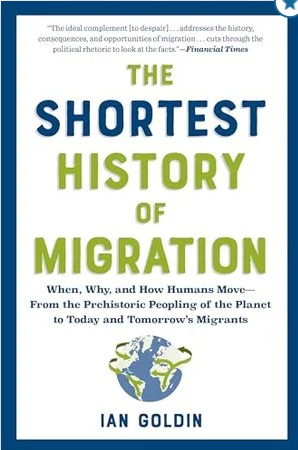New book on history of migration has lessons for present
A new book argues that migration has been essential to the survival of the human species.
Oxford University academic Professor Ian Goldin argues that migration has always been part of the human condition and that people have always migrated to survive.
In his new book, ‘The Shortest History of Migration: When, Why, and How Humans Move-From the Prehistoric Peopling of the Planet to Today and Tomorrow’s Migrants’, Goldin says that humans are a species in motion – from the first steps of Homo sapiens across Africa to America’s ‘melting pot’ and Australia’s multiculturalism.
He says that when we move, in search of better things, or against our will, our beliefs and skills clash and combine, reshaping society time and again.
Prof Goldin focuses on key moments of cultural exchange while carefully examining empire, slavery, and war.
He tells the stories of famous explorers such as Zheng He, exiles like Pablo Neruda, and everyday people in extraordinary circumstances: a Jewish man saved by the Kindertransport, a Japanese gardener who blossomed in Mexico City.
Goldin focuses on the consequences of immigration, beginning with the ever-changing scientific evidence informing the dispersal of the first humans from Africa and continuing through the development of ancient international trade routes like the Silk Road; the rise of involuntary migration through indentured servitude and slavery; the ways in which colonialism continues to influence modern times.
He also looks at genocides, which have often prompted or accompanied mass migrations.
And he discusses the nationalist and capitalistic reasoning behind issuing passports and the role diseases played in sealing previously open borders.
Currently, freedom of movement is being curtailed, even as climate change creates human displacement.
Prof Goldin says passports at every border are a modern invention that can be traced back to WWI.
He argues that it is folly to try to halt migration and proposes a commonsense policy instead.
“For hundreds of thousands of years, the ability of Homo sapiens to travel across vast distances and adapt to new environments has been key to our survival as a species,” says Prof Goldin, an expert on globalisation and migration.
“Yet this deep migratory impulse is being tested as never before. By building ever stronger walls and raising barriers to progress, governments are harming the lives of migrants and threatening the future well-being of our societies,” he says.
Drawn from ancient records and the latest genetic research, it recounts strange, terrible and uplifting tales of migrants past and present, examining the legacies of empire, slavery and war.
Finally, Goldin turns his attention to today’s world, bringing together the evidence of history with the most recent data to suggest how we might create a more humane future– one that allows us to reap the tremendous benefits that migration can offer.
Ultimately, he argues that “migration more than repays any initial expense”.
He says countries need to arrive at a ‘migration bargain’ where people’s legitimate concerns about the number of migrants are recognised.
“Democratic societies have the right to choose how many people are in our societies. But I think we should admit more. More skilled migrants, more students and some unskilled immigrants as well,” Prof Goldin said.
“But we need to ensure there is a bargain. They need to abide by the laws of our land, they need to pay taxes, they need to be documented. In return they have rights such as minimum wages, health and safety, and safe passage.
“It is also vital that as part of this bargain that we clearly distinguish between economic migrants and students that we have the choice on, and refugees who are in legitimate fear of their lives.
“And I think the bargain needs to be between all countries in the world, and particularly between countries that think they are civilised, to have a burden sharing.
“We cannot allow people to die as happened in the Second World War, and in previous periods in history, because there is nowhere safe to go. That’s a question of fairly sharing amongst countries the right of safe passage and asylum processes for people,” he said.
For Prof Goldin, migration is a deeply personal topic. His grandparents and his father fled antisemitic violence in their home country.
Prof. Goldin himself left his home in South Africa as a result of his opposition to the apartheid regime.
“We all owe our background to migration. But for me it’s a personal question. On my father’s side, they all fled the pogroms in the Baltic. They fled Lithuania to South Africa and everyone who remained were killed,” he said.
“On my mother’s side, my mother was born in Vienna, they fled the Nazis first to England and then to South Africa, where I was born. None of the people who remained behind in Vienna survived.
“On both sides, they left everything behind even though they were relatively well off. Then of course, I repeated the story because I, as a South African, got involved in the anti-apartheid struggle and then left South Africa and had the great honour and privilege of going back to serve in the government of President Nelson Mandela when the country became democratic.
“So, I sort of repeated this refugee cycle, which is of the reasons I’m so passionate about this subject,” he said.
In the book, Goldin traces the social, political, and cultural contexts that shaped migration long before his own family made their own journey and that continue to contribute to economic and social equalities in modern times.
“Understanding why inequality persists and how it can be addressed requires that we understand migration,” he says.
The Shortest History of Migration: When, Why, and How Humans Move-From the Prehistoric Peopling of the Planet to Today and Tomorrow’s Migrants, By Ian Goldin, Old Street Publishing, $30.
See an interview with Prof Goldin: Ian Goldin: Could Humans Have Survived Without Migration? | The Agenda – YouTube













